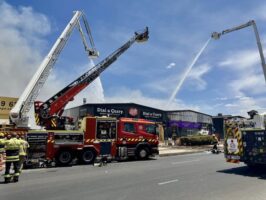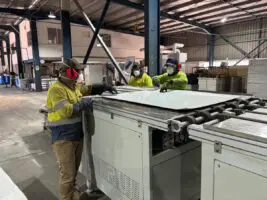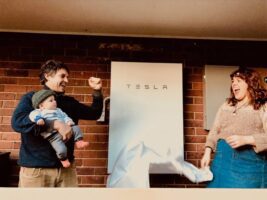Kleenheat, the gas and electricity retailing unit of industrial conglomerate Wesfarmers has signed a landmark 10-year off take agreement to buy the output from what will be the largest solar farm in the state, the 30MW Byford project near Perth.
It’s a landmark deal for a number of reasons:
Firstly, Kleenheat says the solar farm is offering the cheapest source of power, and its contract is likely to trigger a signal a big push for more corporate-based power purchase agreeements.
Secondly, the $70 million Byford solar farm, to be built by WestGen, will outstrip the already completed 10MW Grenough River Solar farm, the soon to be built 10MW Northam solar farm and the 20MW Emu Downs solar farm to be the biggest solar farm in the state.
Thirdly, the solar farm will be the first large scale installation to be built within a metropolitan area – it is located just 35kms south-east of the Perth CBD, in the shire of Serpentine Jarrahdale, on cleared dairy land.
Fourthly, and in a nice touch, the solar farm is being built on land once bought by Western Power for high voltage towers to transport coal-fired power from Collie to Perth. With coal on the way out in W.A., the land has been re-assigned to solar.
Kleenheat will likely get a good deal on the energy because it is buying both the output and the large scale renewable energy certificates, which are currently trading close to $80/MWh, and are likely to trade at high prices for a few years.
“This is a way of securing the best price for the energy at its source, strengthening our ability to compete in the market to secure and retain business customers in the contestable electricity space,” Kleenheat general manager Mark Gadsby said in a statement.
“This agreement presents a real opportunity for the Kleenheat business and sits well with our model of offering great service and competitive prices for our customers.”
Gadsby produced there would be more corporate investment in wind and solar farms, because of the “real cost savings” to businesses.
Gadsby said the new solar farm help the state meet its share of the national renewable energy target, an important consideration given how far the state has fallen behind.
According to data released by the Clean Energy Regulator last week, W.A. has a minimal amount of new projects compared to other states, meaning that the major state-owned retailer Synergy, may have to fund purchases in other states.
However, the WA government has announced the impending closure of the Muja AB coal fired power station, a move that is likely to open up more opportunities for wind and solar.
Richard Harris from WestGen also hopes that new Labor government will work to “open up” the electricity market, to allow for more players to enter the market and write contracts with companies like his.
Harris says there is growing interest in the corporate sector, and there are signs that corporates and institutions in other states are waking up to the fact that wind and solar offer cheaper power than buying from the fossil-fuel dominated grid.
Zinc refiner Sun Metals in Queensland is building its own 116MW solar farm, Monash University in Vicoria has tendered for a wind or solar farm of about 40MW, wile major businesses in South Australia have put out a tender for energy supply, seeking bids from both gas generators and renewable energy developers.
Harris said the agreement with Kleenheat showed that renewable energy was a commercially viable option in WA. Solar also earns capacity credits in the W.A., market – a mechanism not available in other states.
“With technological advances and economies of scale, large-scale renewable energy developers can offer more and more competitively-priced and reliable supply that is environmentally sustainable,” he said in a statement.
Byford would use single axis tracking technology, and be “ready” for battery storage. It will begun construction in June and be completed early next year.
The project is connecting into a low voltage 22kV line, and to accommodate this it will operate as three distinct 10MW units.
Kleenheat retails natural gas to residential and commercial markets in WA and the Northern Territory, and electricity to businesses in WA.
Ironically, the solar farm is being built on land once bought by Western Power for high voltage towers to transport coal-fired power from Collie to Perth. With coal on the way out in W.A., the land has been re-assigned to solar.









